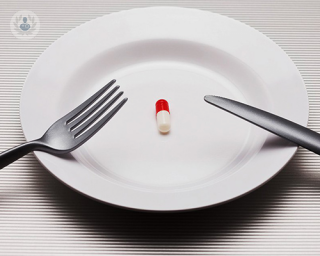Diet therapy
Professor Pierre-Marc Bouloux - Endocrinology, diabetes & metabolism
Created on: 10-19-2015
Updated on: 06-06-2023
Edited by: Aoife Maguire
What is diet therapy?
Diet therapy is a broad term for the alteration or adoption of a diet to prevent or treat a disease or to simply promote optimum health. In some cases, an alternative dietary lifestyle plan may be developed to eliminate certain foods to reclaim health.
An incorrect diet can cause not only weight gain and skin conditions but may promote exhaustion and fatigue. Depending on the disease, if you do not follow the diet advised to you by a specialist it may have serious consequences on your health. A good diet can prevent various diseases.

Why is it done?
For example, if it is to treat obesity or excess weight, weight loss is closely related to a decrease in the number of calories released in the body; in fact, the energy balance must be negative, that is, the calories consumed must be lower than those burned. This is achieved not only by integrating a sports activity into the patient's routine but also by changing the patient's eating habits.
Diet therapy is not limited to weight loss: in fact, this treatment can prevent and treat a whole range of different diseases, with very different characteristics and the diet may depend on the nature of the disorder treated. Below is a list of diseases that can be treated with diet therapy and other clinical treatments:
- Constipation
- Diarrhoea
- Osteoporosis
- Meteorism
- Alcoholism
- Ulcers
- Aerophagia
- Hypothyroidism
- Atherosclerosis
- Heart disease
- Headache
- Hypertension
- Cholecystitis
- Ulcerative colitis
- Intolerance to lactose, gluten or carbohydrates
- Irritable bowel
- Diabetes
- Renal insufficiency
- Anaemia
- Diverticular disease
- Hypertriglyceridemia and Hypercholesterolemia.
What does diet therapy consist of?
The specialist doctor creates a personalised dietary programme to adapt the diet to the patient's lifestyle and health. Depending on the pathology you may suffer from, foods that cause damage are excluded, while those that can cure or prevent the manifestations of the disease are included.
How do you prepare for diet therapy?
Before adopting a therapeutic diet, it is necessary to consult with a specialist doctor, during which the patient's history and medical history are collected. Personal food preferences should be considered (so that the diet is respected more in in the long term) as well as factors such as weight, height, body fat and lean body mass and body mass index.





